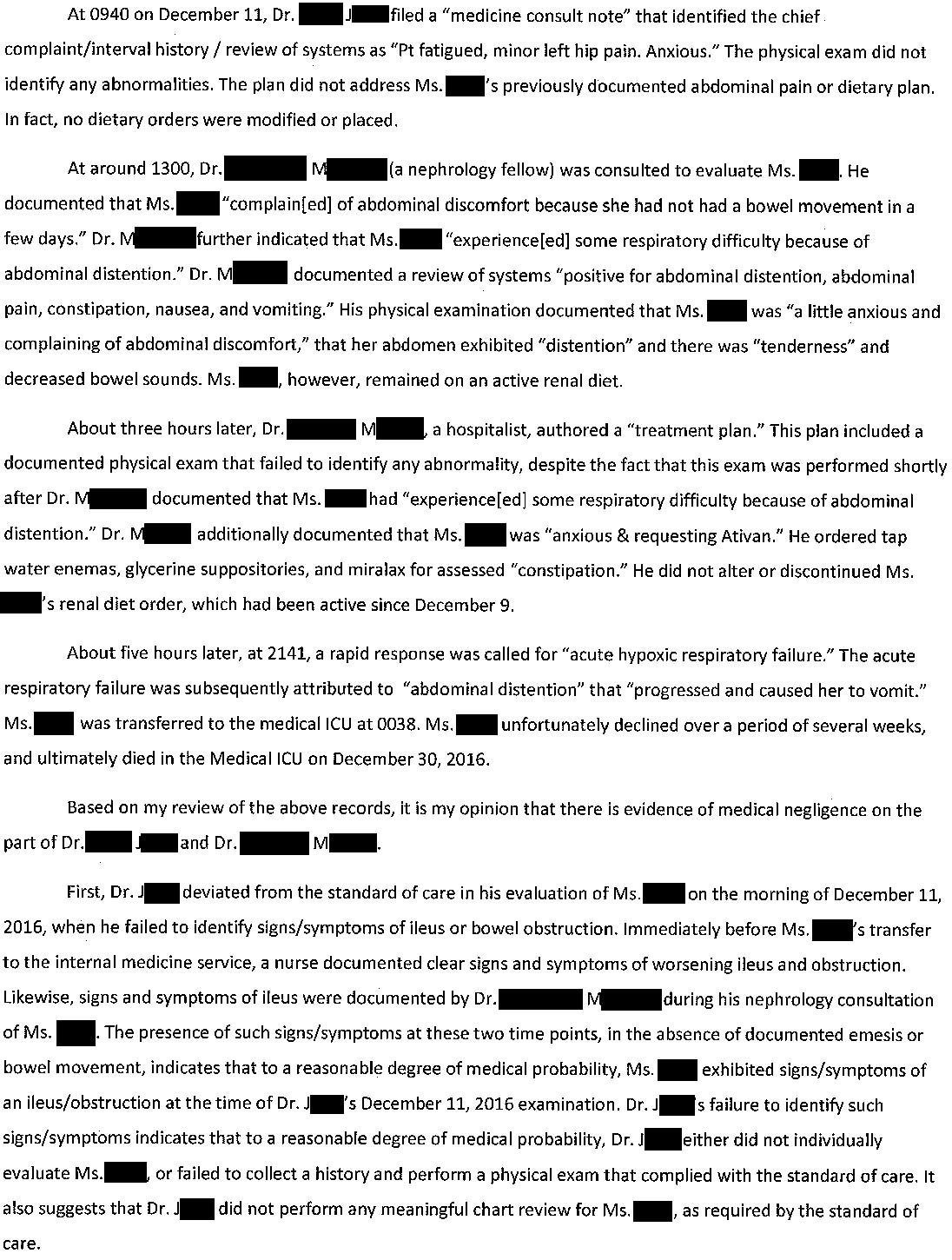A 77-year-old woman presented to the ED after a fall.
She had a surgical history of bilateral hip replacements and a medical history of CKD.
X-rays confirmed a fracture of her left hip.
Ortho was consulted, and she was admitted to the orthopedics service.
The admission occurred late in the day on December 6.
The OR was already very busy on the 7th, so her surgery occurred on December 8.
A left hip revision arthroplasty was completed without incident by the attending (Dr. L) and several ortho residents.
The morning following the surgery (December 9), she was started on a renal diet.
However, she vomited and was unable to have a bowel movement.
An ortho resident saw her, and ordered an abdominal x-ray.
The impression stated: “Dilation of the small bowel with some gas in the colon which may represent an early small bowel obstruction versus ileus.”
The resident told the nurse to change her diet order back to NPO (no order placed but the nurse documented it).
Enemas and suppositories were ordered.
The nurse documented a “large” bowel movement.
Her family would later stated in depositions that the bowel movement was very small in size.
Join over 10,000 doctors and attorneys on the email list.
Free and paid options available.
On December 10, she seems to have had waxing and waning of her abdominal pain.
The ortho residents documented that her ileus resolved.
The nurses documented “discomfort in abdomen, passing gas and belching”.
She was given several doses of opioids to treat her pain.
She was transferred to another floor, where she was given a diet because there was no NPO order.
On December 11, she was seen again by the ortho residents.
No abdominal exam was documented.
Later that morning, ortho requested a nephrology consult and a medicine consult.
She was seen by a hospitalist (Dr. J) around 9:40am.
He did not document any abdominal complaints or abnormalities on exam.
She was next seen by the nephrology fellow (Dr. M) around 1:00pm.
He documented abdominal pain, distension, vomiting, and that she was experiencing “some respiratory difficulty because of abdominal distension”.
She was seen by a second hospitalist (Dr. M) around 4:00pm.
No abdominal issues were documented but he did order enemas, glycerine suppositories, and Miralax for constipation.
At 9:41pm she had a large episode of emesis.
She aspirated the emesis and rapidly developed hypoxic respiratory failure.
A rapid response was called and she was intubated.
She continued to decline over the next few weeks.
She died in the ICU on December 30.
Her family hired an attorney and sued the ortho attending (Dr. L), both hospitalists (Drs. J and M), and the hospital itself.
They did not sue the nephrology fellow or any of the residents.
The allegations included the following:
Misdiagnosed of ileus or bowel obstruction
Failure to cancel her diet order and make her NPO
Failure to perform gastric decompression
Untruthful documentation of a “large” bowel movement
A hospitalist was hired as an expert witness:
Become a medicolegal expert through spaced-repetition review of lawsuits from across the breadth of medicine.
Buy a subscription to get new cases every week:
An orthopedic surgeon was also hired:
The family offered to settle.
Thus far, the two sides have not reached a settlement.
The lawsuit is still ongoing.
Join the email list to get notified of updates.
MedMalReviewer Analysis:
This case brings up one of the oldest and most passionate debates in hospital politics: Who should admit elderly patients with hip fractures? Some hospitals are able to navigate this issue with relative ease, but in some cases it gets re-litigated with every single admission. It often depends on the personalities of the orthopedic surgeon and/or hospitalist on call at any given time, and seems to always involve discussion of a mysterious admin meeting where this was “settled”. I’m not sure this case provides any definitive answer either.
Verbal orders are vital to providing good care in emergency situations. A blanket ban on verbal orders may paradoxically create unsafe practice environments. However, they come with significant risk when used in non-emergency settings. The verbal order to make her NPO was lost as she was transferred between floors and went through multiple nursing and physician hand-offs.
I find it curious that two separate hospitalists did not document any abdominal issues, both before and after the nephrology fellow made very alarming statements in his note. Either they were both very cursory in their history and exam, or she may have had significant waxing and waning of her symptoms. I can’t say with certainty. Regardless, the nephrology fellow’s note is quite damning, putting both hospitalists in a difficult position and handing a gift to the plaintiff’s attorney.
I’m generally opposed to residents being named as defendants in medical malpractice lawsuits, barring extreme circumstances. They should be working under the direct supervision of an attending physician, who is ultimately responsible. I think this attorney made the correct decision in only naming the attending.
I never thought I’d read a case in which the size of someone’s bowel movement was a point of argument.











As a former hospitalist, this is a bread and butter case and this outcome is embarrassing. I would absolutely settle. Did no one review the abdominal xray?? NPO, ngt for decompression, IV Fluids, general surgery consult, small bowel series/follow-through in a couple days. Thank you and good night.
I think $6.5M is far too much for a frail 77yo who already had 2 hip replacements. They are unlikely to live 5-10yrs, no loss of earnings. I am curious what the financial pros think? However post-op ileus/obstruction was considered, there to be diagnosed and still missed. I would consider that the very definition of negligence. Had she been diagnosed and treated she may still have had complications and may have died for another reason. Regardless she would be in a rehab/SNF and not go back to her prior baseline